2019
Rhythm Week Four: Connecting with God in His Story
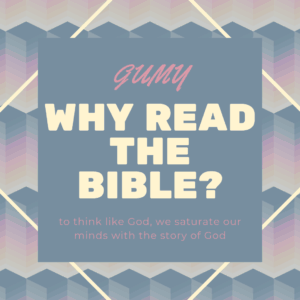
One way we can connect with God is through reading Scripture. Scripture is many things, but, we’re going to describe it as three things in specific: Scripture is a story. Scripture is teaching. Scripture is connection.
Scripture is a story.
Or rather, Scripture is a collection of stories. It spans over 4000 years and has 35-40 authors, and took roughly 300 years to put together in its current form. It tells the story of God and His people. And it is our story. As Christians, we are continuing this story in our present day and time. We don’t read Scripture to learn historical facts, despite this importance. We study Scripture to learn the narrative of God, where we have come as a people-group and our place in it.
Scripture is teaching.
We all have a longing to live a really good life, to be good people, and we all want to know how to live a life of meaning. In Scripture, particularly in the teachings of Jesus, we have God’s instructions on how to live life to the fullest, and to be people who are glad to be. While there may not be “all the answers” to specifics, and there are a lot of things we address in our daily life that Scripture doesn’t mention, the wisdom in Scripture is meant to grow us into people who are able to make wise choices that are in aliment with God’s desires.
Scripture is connection.
When we engage in Scripture, we are able to connect with God. We learn about His likes, dislikes. We learn about His emotions, desires, wants and needs. We learn about His nature, character and essence. But, in Scripture, we also connect with our own selves. We learn about the condition of our hearts. We learn about our own desires, wants and hopes. But what’s more, we connect with the larger Christian community. Billions of people have read and studied and prayed the very words we’re reading, studying, and praying. Jesus prayed the Psalms, just as we do! How cool is that!
So, reading, studying, praying, and memorizing Scripture is a way for us to love God, live like Jesus, and change the world!
2019
Rhythm Week Three: Connecting with God through Sleep
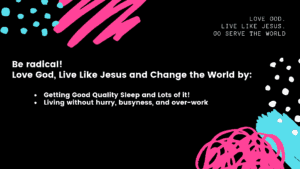
The very first of the Bible starts off: In the beginning, God created everything. But, what about before the beginning? What was God doing before He created the world?
Before “in the beginning”, God was resting. He was enjoying His existence. He was simply being.
And out of His abundant rest, He created. And then rested again. And He instructed His people to honor a day of rest.
In the Hebrew culture, the day actually began as the sun went down. At sunset, the day would begin. What this means is that the very first thing one would do in their day was sleep. Resting would be the way to initiate the new day. This is in stark contrast to our current lifestyle where our day begins when the sun rises and the first thing we do with our day is head to work, or school.
A lesson to gleam from this is to work from our rest-not the other way around. So often we work and work and work hoping that we’ve done enough to earn a rest. Or, we tell ourselves “once I finish this and that I’ll take a break and relax”. Of course, there is always another “this and that” to do after we finish “this and that”, and we rarely give ourselves permission to rest, rejuvenate and renew. We think rest will be the overflow of our work, which is the opposite of what we see with God in the creation story.

We’re talking about ways we can create a life or harmony with God. What we see of God is that God is a God of rest. So if we’re sleep deprived and overworked, that isn’t God’s fault. That’s our fault. God never calls someone to burnout, workaholism, being too busy, being worn down and beat up. God doesn’t decide what we do with our 24 hours-we decide. We choose what to do with our time, what obligations to consent to, what arrangements to make. The good news is, we can arrange our days and lives to be people who are well rested and well-slept.
But first, we need to address two common (and unfortunately accepted) obstacles to living fully with God and that is sleep deprivation and busyness.
When it comes to a lack of sleep, we excel. This success is being void of sleep is detrimental to our lives, as well as to our spiritual well-being. Among many, many other issues: 26% of all fatal car accidents are due to driving while drowsy; adolescents who routinely get less than 7 hours of sleep a night are 10x more likely to develop clinical anxiety and 7x more likely to develop clinical depression.
Do you think God desires for us to live like this? Do you think this is God’s will for humanity?
Most of us know that the dominant suggestion is eight hours of sleep a night. This means, we are meant to spend one-third of our day asleep, and therefore, one-third of our life asleep. We have been created, or we have evolved into being a species that is meant to spend one-third of its existence asleep. When we sleep, God is pleased as we are fulfilling one of His creational intentions for us. When we sleep, we are abiding by what naturally we crave, need, and require.
Sleep is one of the most important things we can do in our day. Sleep means our health is improved. But even more than that, sleep means we’re able to live out the fruits of the spirit easier. I’m sure we can all remember a time when we were sleep-deprived and therefore, it was much easier to be impatient, cranky, ungrateful, and maybe even downright mean. When we haven’t been sleeping well, it is challenging to be a people of love, hope, peace, joy, thankfulness, gentleness, kindness and compassion.
Sleep means we can enjoy the life we’re awake for. We have this narrative in our culture that we’ll sacrifice sleep so we can have another hour or two (or three or four) to do more with our lives. The challenge is, for most of us, when we are sleep deprived we are unable to enjoy the hours we are awake. We’re addicted to a stimulus to keep us going, we’re lethargic, exhausted, sluggish and go about our day in a zombie-like daze. I believe that Jesus spent His waking hours with vigor, energy and animation.

Part of our mission is to love God, and we can love God by sleeping well.
Okay, let’s switch gears. How would you describe Jesus? What words would you use?
I doubt that any of us used the words “hurried” or “stressed-out” to describe Jesus. Jesus had a lot to do, to be sure. He had many responsibilities, duties, roles and tasks to perform. However, when we read the Gospels it is quite clear that He was not hustling about frantically and frenzied. I know that in our culture we wear busyness as a badge of honor. We like to believe we are important, of value, and have significant worth if we are overly busy, and have a massive to-do list. We’re afraid that people will think we aren’t doing much with our existence if we come across as something other than busy.
As Christians, we’re supposed to look something like Jesus. Part of our mission statement is to live like Jesus. So, what are we telling the world about Jesus when we’re worn out, exhausted, cranky, beat-down, overworked, and stressed?
There’s a popular comment, about being too blessed to be stressed. However, if we are honest, most of us are too stressed to be blessed. We are too stressed to notice and appreciate the people who love us and enrich our lives. We’re too stressed to notice small wonders of beauty like birds, flowers, and even softly drifting clouds. We’re too stressed to appreciate the immense amount of items we have, and too stressed to care for them or worthfully maintain them. And we are certainly too stressed to be a blessing to others.
This isn’t the vision for life Jesus invites us to. He calls us to come to Him and He will not only give us rest, but teach us a life of rest, refreshment, and renewal. One way we can begin to become more restful and relaxed people is through margin.
Margin is simply incorporate a time of nothingness in your day. It can be five minutes, or thirty, but it is developing a habit of having nothing to do. It is buffering time into your schedule to avoid being overworked, hurried, and always behind. It is incorporating a few minutes to ensure that there is some time alone in which there aren’t demands being made on you.
Two was to think of this are a book, and a staircase. In any book, there are words on a page. This represents all the tasks you have, assignments to complete, meetings to attend, projects to work on, chores to finish. But, surrounding those words is a lot of empty blank white space. This is margin. This is time without anything to do, except rest and be refreshed.
In any staircase, there are always flat platforms in between stories. The stairs represent all of our daily activities, assignments, and to do lists. We climb, and climb, and climb. And with each step we become tired, sweaty, and wishing for a break. The flat platform at the top of the staircase, or in the middle of the stairwell is margin. It is that break we long for. It is an opportunity to catch our breath.
As Christians, we are called to live counter-culturally. One simple way is to be a people who are well-slept, and living without hurry. Live radically and get yourself sleep tonight. Live radically and buffer in ten minutes to simply watch the clouds float by.

2019
GUMY Rhythm Week Two
We continue in our series “Rhythm” in which we are talking about the central idea of arranging our lives to live in harmony with God, and the central truth that we become our habits.
Last week we talked about attention. We discussed that what we pay attention to we will end up loving. And, we learned a little way of remembering to pray using our hand.
God really, really, really likes spending His day with you. Honestly. He loves it. He loves being involved in your life. He loves being with you each moment. There isn’t anything in your life that God doesn’t want to be involved in.
When you wake up, God is there like: YES. I’M SO EXCITED AND READY TO DO THIS DAY WITH YOU. I’M FREAKING PUMPED UP.
But, sometimes we don’t really want God in our lives that much, and sometimes we do want God in our lives, but we just don’t know how to recognize His presence and excitement.
So, we’re going to look at two verses that will give us an indication on how to begin to live with a little bit more of God in our lives, and establish a rhythm of finding God in our days. Both of these verses talk about habits.
Last week, we looked at the verse that starts with:
“Love the Lord your God with all your heart”
But, my question to you is, what is the heart? What does it mean to love someone, or something with all your heart? This is a verse we hear a lot in the church, but rarely do we unpack it. What is the heart and how do we love someone with it?
You are a human being, and you are made up of a lot of different things. You have your body, your heart, your social relationships, a soul, so what does it mean to love something with all your heart?
Well, in the Scriptures, your heart and your will, are the same thing. It is a big plot twist I know!
So, then, the question becomes, what is our will?
Your will is your ability to choose. It is your ability to make choices; to create; to bring something into existence that never existed before. Your will is unique to you.
All our habits, all our choices, everything we’ve created or spoken is the result of our will, and what we choose to do, or watch, or listen to, or pay attention to, we will become.
God created you with a unique will/heart. No one else gets to make the choices you make in your specific context and no one ever will. No one in history has been you, and no one in history will ever be you. You are you, and you alone.
And you are a human being and Human beings have the amazing capacity-no other creature has this-to choose; to think about things, and weigh options, and reflect on the past and predict the future, and make a choice.
So, let’s read this verse again, and let’s use the word will, or how we define it and read it like this:
Love God with all your choices, with everything you create, with all your habits, with all your daily routines and everything you do and don’t do. Whatever it is you choose to do-make it God focused, because no one else will ever be able to live your life with God the way you live your life with God.
Now this is an amazing invitation! And to fully live into it, we need to know what a habit is, and what our habits are! We all have habits and we can’t live without habits and that’s usually a really good thing! Habits are helpful in so many ways, and ultimately, we become our habits. We are what we repeatedly do.
All habits follow the same cycle:
Cue-routine-reward.
So, brushing our teeth. The cue might be that it’s morning, or we just ate, or our mouths feel gross and dirty. What’s the routine? Right, putting toothpaste on our brush and brushing our teeth? What’s our reward? A fresh feeling, people won’t be grossed out by standing close to us, maybe a kiss, who knows.
And this is true for things like looking at Instagram, chewing our fingernails, twitching our foot, swinging a baseball bat, throwing a football, or doing a pirouette.
But, what about things like:
Praying?
Giving to the poor?
Loving our enemy?
Not gossipping or making fun of another person?
Standing up against racism?
Do these follow the same habit loop? Absolutely they do. And, our heart-our will, is our ability to choose what our cues and routines, rewards are.
But the challenge is, how many of us are aware of what our habits are, or what they say about us? Let’s do a quick poll:
- How did you spend: Your last 75 dollars?
- What were the last 15 Instagram posts you liked?
- What were you thinking about when you were brushing your teeth this morning? What about when you were putting on your shoes?
- What do you do when you’re stopped at a red light?
- What do you typically eat for dinner? How much does it cost per meal, how does it impact your body and how many people were involved in bringing it to your table?
- Who were the last five people you spent time with?
- Who were the last three people you said thank-you to, or I love you to?
- Who did you last talk on the phone with, send a text to?
See, most of us don’t know how we are spending our time, devoting our attention to, or what habits we have. And we need to know how we spend our days, because, like the author Annie Dillard says,
“How we spend our days is how we spend our lives. What we do with this hour is what we do with our life.”
So, knowing how we spend our minutes, hours, days, and years is super important.
Now, a really wonderful thing about habits is that we get to choose what they are. We don’t get to choose if we have habits, but we get to choose what our habits are.
And this is what it means to repent. To repent doesn’t mean to feel bad about who we are or what we’ve done. Rather, when Jesus says “repent for the Kingdom of God is available to you”, he uses the word metanoia, which means, “Think about your thinking. Think about your habits. Think about your way of living. Because, God is near and you can interactively live with Him.”
2000 years ago, the apostle Paul wrote this to some folks he knew:
So here’s what I want you to do: With God helping you: Take your everyday, ordinary life—your sleeping, eating, going-to-school-and work, and walking-around life—and place it before God. Embracing what God does for you is the best thing you can do for him. Don’t become so well-adjusted to your culture that you fit into it without even thinking. Instead, fix your attention on God. You’ll be changed from the inside out.
There’s that attention word again. So, what do we do with that? Well, one way we can put our verses from tonight into practice is through association and prayer.
Choose everyday items you use (phone charger, pillow, toothbrush, car keys) and associate a prayer or a Bible verse with them. That way, when you go to use them, you will be prompted to pray or recite Scripture.
2019
GUMY: Rhythm Week One
This week, we begin a new series, RHYTHM, in which we’re discussing developing healthy habits that foster a healthy relationship with God, and with others.
All of us live our lives with some sort of rhythm. We engage in routines or patterns of living, and in reality, these patterns actually tend to run or ruin our lives.
Our routines are like a trellis.  A trellis is a tool or framework that helps plants and trees grow. In order for some trees and plants to grow, they need a structure to build on. And that’s why we have a trellis. If fruit trees don’t have this, they can’t grow healthy and strong and can’t produce good fruit. If plants don’t have this, they lay flat on the ground and can’t get the nutrients they need and end up being sick, and maybe die. So this tool, this trellis is super important.
A trellis is a tool or framework that helps plants and trees grow. In order for some trees and plants to grow, they need a structure to build on. And that’s why we have a trellis. If fruit trees don’t have this, they can’t grow healthy and strong and can’t produce good fruit. If plants don’t have this, they lay flat on the ground and can’t get the nutrients they need and end up being sick, and maybe die. So this tool, this trellis is super important.
Our routines are like a trellis. They are structures we build our lives on. They give guidance, direction, and momentum to our lives. They impact who we are, and what we do.
However, Most of our routines we don’t even pay attention to.
What about social media? Is it part of your daily rhythm? In what ways does social media shape your life? Do you have any routines around social media?
Social Media
The average American spends 4 hours a day on social media, 3 hours a day watching television (or Netflix or Hulu). If you were to add up all the hours over the course of a lifespan that are spent on Instagram or Hulu, you could use that same amount of time to fly to the moon and back 32 times, run 10,000 marathons, or climb Mount Everest 30 times.
Now, I’m not here to tell you to get off social media, your phones, the internet and so on. What I’m going to ask you is, is it being used in a healthy way? And in what ways is it crowding out your relationship with God? Is there any room in our days for a little bit more of God, and a little less of technology? Is it that we don’t have time, or maybe we just have rhythms that aren’t helping us make the best use of our time?
At the end of your life, you probably won’t be laying on your deathbed, saying, “I wish I was on Instagram more. I wish I earned more Candy Crush points. I wish I saw more tweets. If only I had more time for Reddit threads!”
Jesus reminds us of the best use of our time: Love the Lord your God with all your heart, all your body, with all your thoughts, and with all your attention.
We aren’t going to spend a ton of time trying to describe love in this post. But, I want to leave you with two thoughts on love:
Love is an action, and furthermore, love is an action that does good for another. It requires effort, action, something tangible. If we say we love our dog, but we don’t ever feed our dog, walk our dog, take our dog to the vet, give our dog chew toys, play fetch with our dog, give our dog flee medicine-would you say we love our dog very well? All of those things, are acts of love. And that word, “act” is important. Love is an action. 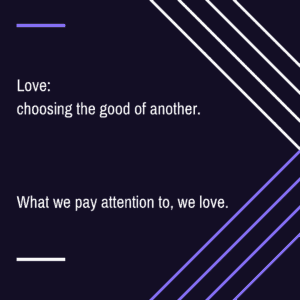
Secondly, We can tell what we love based on what we pay attention to. What we give our attention to, our time to, our focus to, our energy to, we love. And what we give our attention, energy and time to, we will end up loving.
So the more time I spend on social media, the more I’ll love it. The more attention I give to my phone, games, taking selfies, the more I’ll love it. Conversely, the more time I give to God, the more I’ll know His love for me, the more I”ll become like Jesus, the more we’ll change the world for the better.
So, what is one way we can grow our love for God/feel God’s love for us, live like Jesus, and go change the world?
One simple way to love, is through prayer. 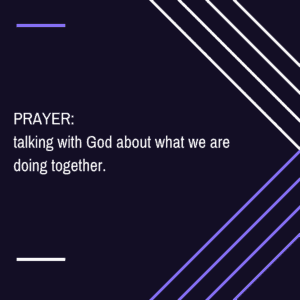
Prayer is simply talking with God about what we are doing together, talking about the various hopes, and fears and projects and assignments and events going on. Prayer can be one of the posts in our trellis. It can help us grow strong, live healthily, make good choice, recognize God’s love for us, and change the world for the better.
So, in your discussion, breakout groups, we’re going to do an exercise to help us include prayer in our day-to-day for the next week. Prayer. It is pretty simple, it’s the hand prayer.
Hand Prayer
We assign a prayer prompt to each one of our fingers.
Since our thumb is closest to us, we pray
for those closest to us: our family, friends, pets. Our pointer finger reminds us to pray for people who point us in the right direction: teachers, coaches, pastors, band instructors, mentors. Our middle finger is our tallest finger so we pray for people in in positions of power, like politicians, principles, and business leaders. Our middle finger also is a symbol of dislike
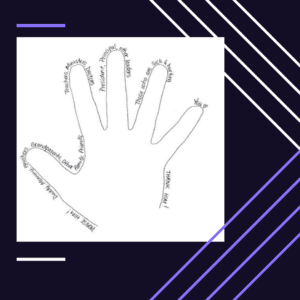 towards someone, so we can pray for people we dislike. Our ring finger tends to be pretty weak, so we pray for people in need, or folks who are lonely, hurting and suffering. And our pinky finger, we pray for ourselves!
towards someone, so we can pray for people we dislike. Our ring finger tends to be pretty weak, so we pray for people in need, or folks who are lonely, hurting and suffering. And our pinky finger, we pray for ourselves!
Give it a try this week, and let us know how it goes!
